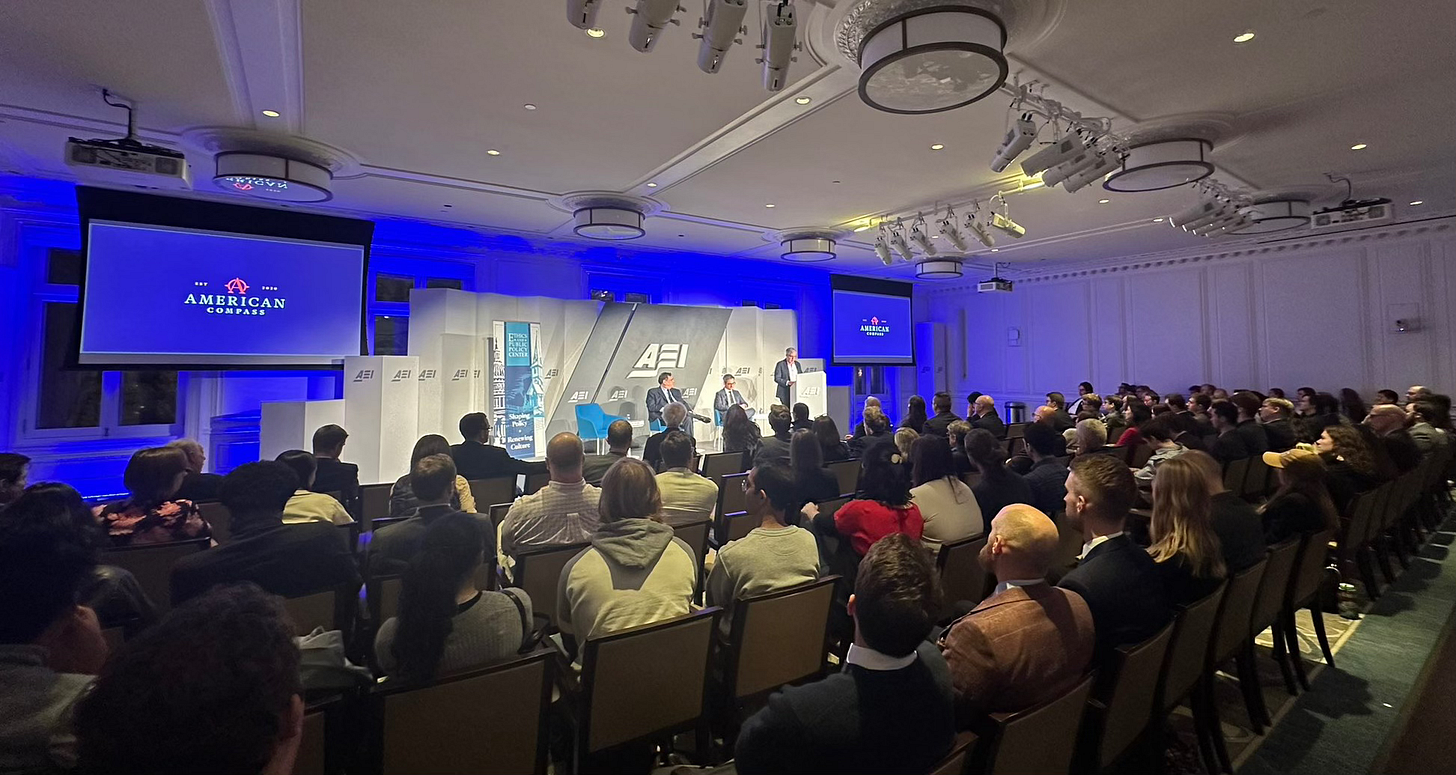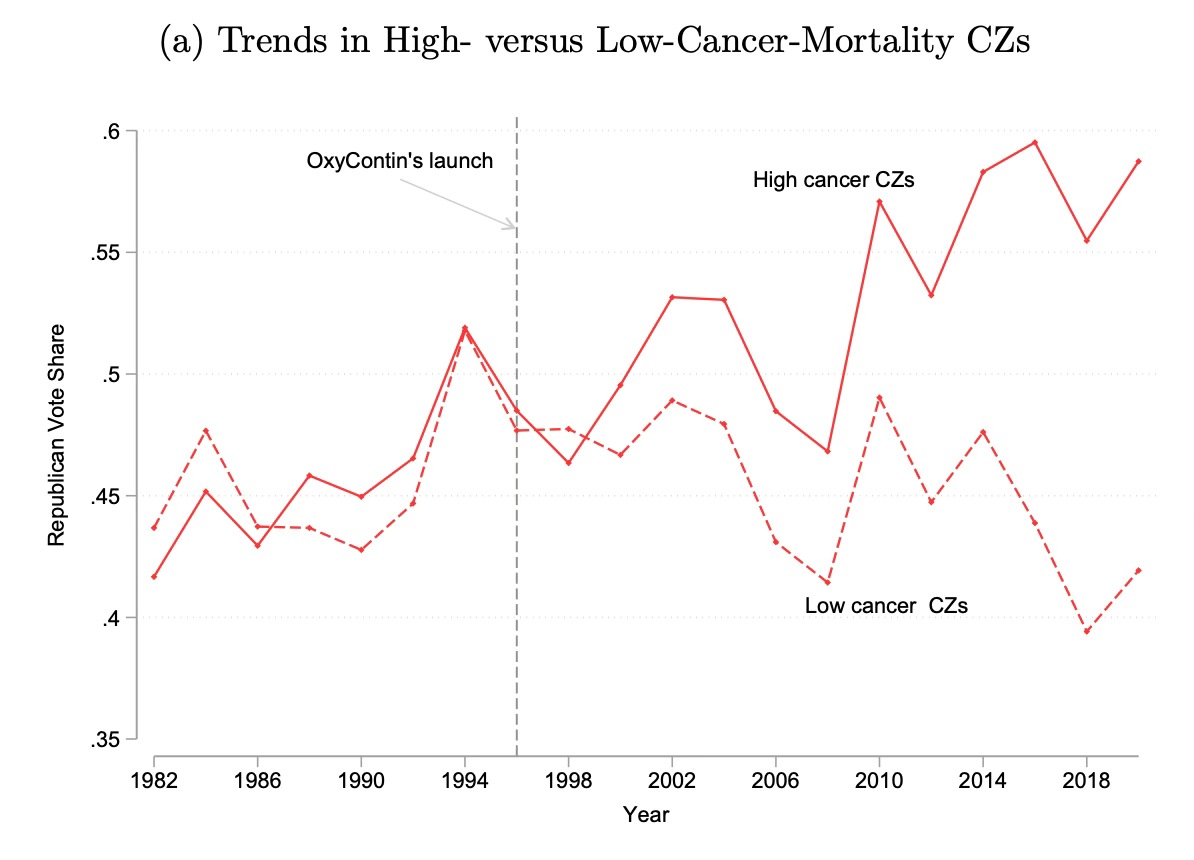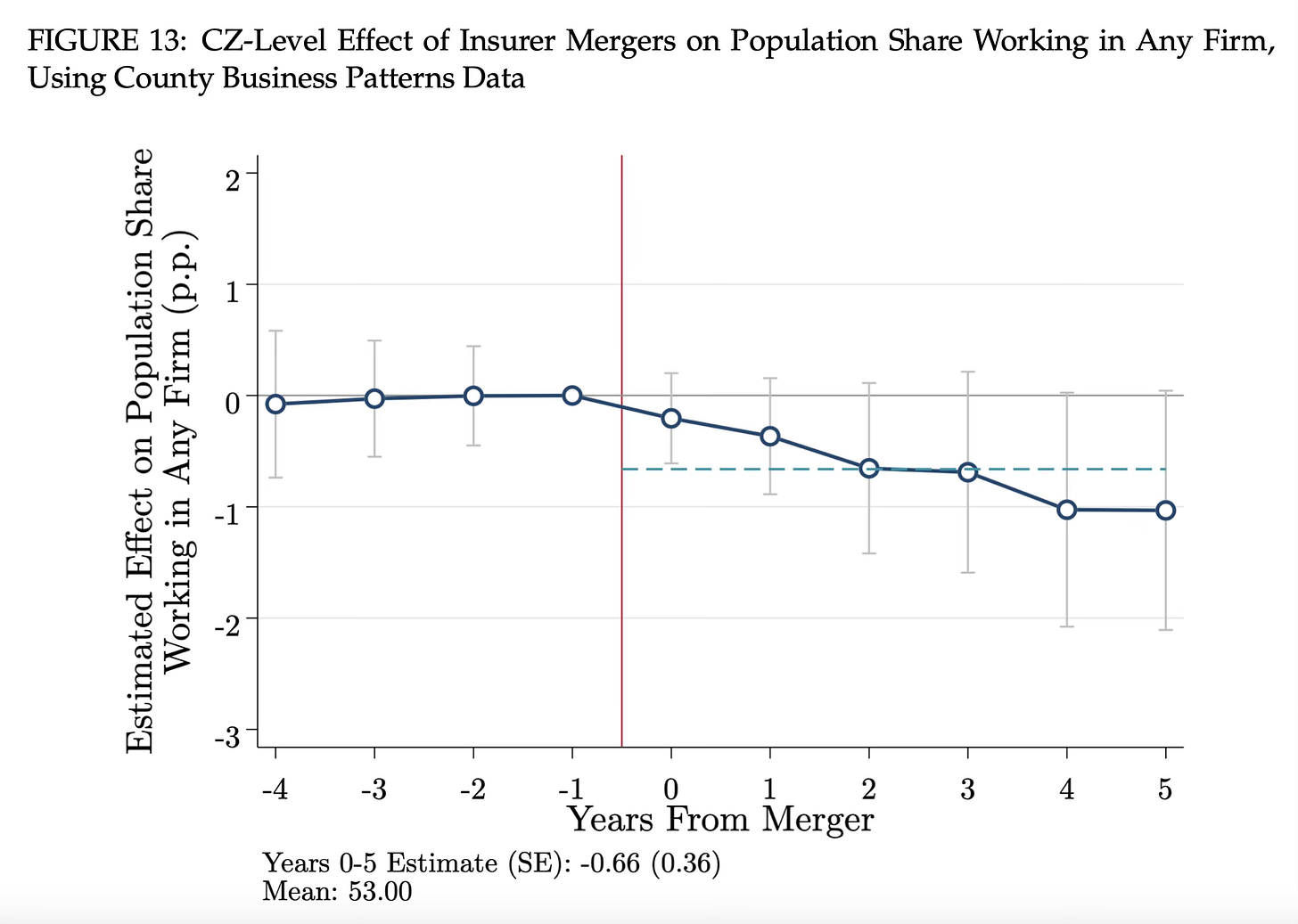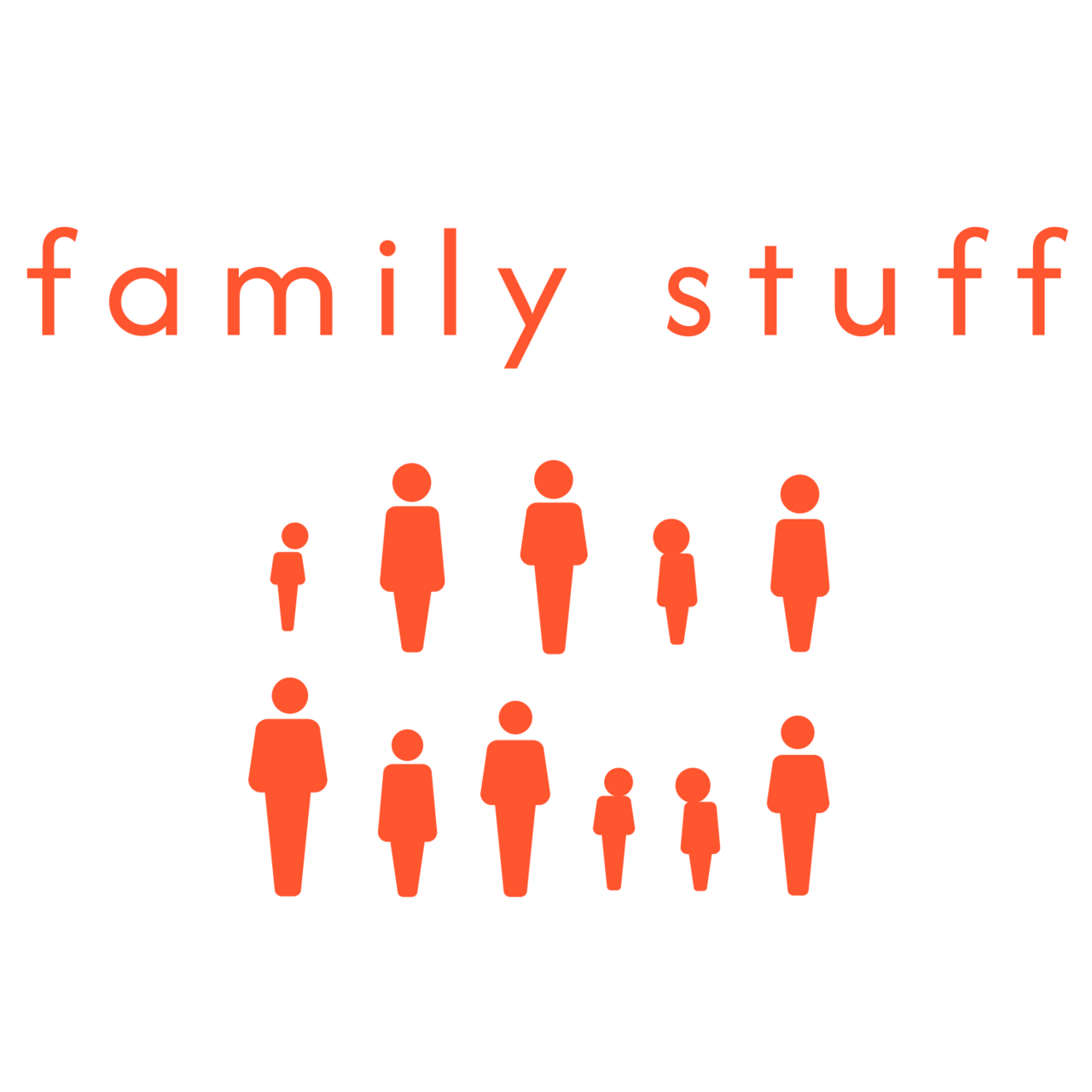Two Roads Diverged In a Single Conservative Movement
EPPC's "Crossroads of Conservatism" debate series kicked off this week with a bang
Quick programming note — Family Matters will be off next week in observance of Thanksgiving Day and in quasi-observance of Black Friday. But before we feast:
The Main Event: EPPC-hosted debate series offers conservatives food for thought
Research Roundup: Fun research papers you might have missed
It’s Me, Hi: Public Discourse, Politico, and National Catholic Register
Quick Slants
The Main Event
On Twitter, the Foundation for American Innovation’s Max Bodach called it his own personal Tyson-Paul bout, and if it didn’t break streaming records, the latest round of Oren Cass v. Scott Winship certainly landed more substantive blows than the made-for-Netflix publicity stunt earlier in the week.
Cass, of course, has made a name for himself seeking to “re-orient” conservative economics; Winship has been, at times, his chief foil, pushing back against what he sees as the “declinist” tendency in Cass’ read of the data. Their most recent head-to-head was focused on technical disputes and accounting methodologies; their rematch Tuesday was a big picture look what’s happened to the typical Americans’ “quality of life” over recent decades.
It was part of the five-part “Crossroads of Conservatism” debate series, sponsored by the Ethics and Public Policy Center and organized by my EPPC colleague Henry Olsen. At a time when conservatism — and its main political vehicle, the Republican Party — seems much confident in what it stands against than what it stands for, these debates are intended to shine a light onto different ways of thinking on the right. And the Cass/Winship bout set the stage for any number of fascinating intra-conservative cleavages.

Cards on the table here — there is no way for me to be impartial when these two go toe-to-toe. When I was a staffer on the Joint Economic Committee, Winship was the executive director; immediately after I left the Hill, my first project was editing the Edgerton Essays series for Cass’ think tank, American Compass, where I still contribute on a regular basis.
So in lieu of my own gloss, I will urge you to check out the video from this week, particularly the exchanges after the opening statements.
If the two things that stand out to you are the same that stand out to me, they might be:
The most famous classic blunder may be to never get involved in a land war in Asia, but only slightly less well-known is to never pick a fight about interpreting microeconomic data with Scott Winship.
Yet Cass’ success in capturing and retailing his message of disappointing economic and cultural trends suggests a hunger for many on the right (and left) for there to be a tangible reason, or set of policy choices, behind the common sentiment that too many things “just don’t work they way they should.”
My only editorial comment, such as it is, is that the populist strain on the right pretty clearly gets much of its energy from the Iraq War, financial crisis, and economic slump of the years that followed. Foreign policy questions are outside the scope of this newsletter. But it’s also increasingly clear that economic trends — particularly for those at the bottom half of the income distribution, as and Reihan Salam point out in the most recent “Matter of Opinion” podcast from the New York Times — are much better today than they were when Trump came down the golden escalator, even notwithstanding the chaos of Covid. The story in which most Americans are now no better off than they were decades ago is not true today, but it may even feel less true with sound economic management and continued hot labor markets.
Unfortunately, our print deadline and some A/V issues with the livestream prevent a full recap of the week’s second debate, on industrial policy, between National Review’s Andrew Stuttaford and American Affairs’ Julius Krein. It is available on YouTube, as will the following three events in the series:
Are Tariffs and Subsidies Worth the Cost? Trade in the Age of Trump
Michael R. Strain vs. Michael Lind
Wednesday, December 4, 5:00–7:00pm (YouTube link)
Baby Bonuses and Burdens? Federal Financial Policy for Families
Patrick T. Brown (of course I know him, he’s me) vs. Catherine Ruth Pakaluk
Date: Tuesday, December 10, 5:30–7:30pm (YouTube link)
Religious Diversity and American National Identity
R. R. Reno vs. Avik Roy
Date: Tuesday, December 17, 5:30–7:30pm (YouTube link)
Be there, or be uninformed about the various strains within the conservative movement!
Research Roundup
I’ve been meaning to include more nods to interesting research that doesn’t quite merit a full write-up but there’s just been too much #content lately to squeeze it in lately. So here’s some papers to skim through on the couch watching football next week (n.b., the first two are working papers, so subject to revisions as the authors go through the process):
Republican Support and Economic Hardship: The Enduring Effects of the Opioid Epidemic, working paper
Carolina Arteaga (University of Toronto) and Victoria Barone (University of Notre Dame)The quasi-exogenous shock of Purdue Pharma’s marketing efforts around Oxycontin has been previously used to study state policies around prescription and drug abuse by Alpert, Evans, Lieber, and Powell (QJE 2022). Here, the authors use it to look at the downstream political consequences of opioid deaths on political outcomes — they find areas that had higher cancer deaths in the 1990s, and thus were subject to more intensive marketing efforts by Purdue, saw higher rates of opioid deaths and, eventually, a growing share of the electorate switching their votes to the GOP (CZs stand for Commuting Zones)
Causes and Consequences of Rising Employer-Sponsored Health Insurance Costs: Evidence from Insurer Mergers, working paper
Jessica Min (Princeton University)
Health benefits are a large and increasing share of employer costs, which depresses job and wage growth. This paper looks at what consolidation among health insurers is doing to employment, finding that mergers are contributing to higher premiums (with no increase in quality), higher employer costs, and dampening employment, particularly among workers without a college degree (and a commensurate rise in part-time workers who are not eligible for health benefits.) The paper estimates the rise in health insurance costs decrease aggreate employment by 1.9 percentage points overall, with evidence being seen at the county level following a health insurer merger.
The Effects of State Workplace Pregnancy Accommodation Laws on Women’s Employment and Income during Pregnancy, Social Service Review (forthcoming)
Alejandra Ros Pilarz, Jessica Pac, and Anna K. Walther (University of Wisconsin-Madison)“…We find [pregnancy discrimination] laws increase labor-force participation, employment, weeks worked per month, and earnings among all pregnant women, with larger effect sizes for less-educated women. We find less robust evidence that these laws increase household income.”
The Child Penalty Atlas, Review of Economic Studies
Henrik Kleven (Princeton University), Camille Landais (London School of Economics) and Gabriel Leite Mariante (London School of Economics)“At low levels of development, child penalties represent a minuscule fraction of gender inequality. But as economies develop — incomes rise and the labor market transitions from subsistence agriculture to salaried work in industry and services— child penalties take over as the dominant driver of gender inequality.”
The Impact of Divorce Laws on the Equilibrium in the Marriage Market, Journal of Political Economy (forthcoming)
Ana Reynoso (University of Michigan)
“The adoption of unilateral divorce across the United States…[increased] assortative matching among newlyweds…Effects are largely due to changes in choices when risk sharing and cooperation within marriage decrease.”
It’s Me, Hi
For Public Discourse, I conduct my post-mortem on what the 2024 election results meant for the pro-life movement, and what challenges and opportunities a second Trump administration poses:
“A policy agenda that responds to those concerns won’t inoculate the pro-life movement from future political losses. But it needs to be a major part of our efforts going forward on a moral level, as well as the level of practical politics. As the conservative coalition slowly slides towards a post-religious orientation, and as progressive politicians become ever more committed to removing all barriers on abortion at any point in pregnancy, prioritizing legislative efforts to expand support for families will become a political necessity.”
I also moderated a (in my opinion) fun panel on the prospects for pro-family tax policy in 2025. Special thanks to Joseph Zeballos-Roig, John Shelton, Leah Sargeant, and Autumn Christensen for being willing to share their thoughts and perspectives about what might be on the table for a GOP trifecta. I am reliably informed the video for this panel will be made available “soon.” In the meantime, our webinar was covered by National Catholic Register senior editor Jonathan Liedl.
I was quoted in Politico’s coverage of pro-life concerns over the nomination of Robert F. Kennedy, Jr. as HHS Secretary:
“A lot of my friends [said during the campaign], ‘Hey, look, you may not like President Trump. You may think that he’s not suited for the office. But think of the people who he will appoint. Think of what a pro-life HHS secretary can do with the way that they interpret regulations and executive actions,’” said PATRICK BROWN, a fellow at the conservative Ethics and Public Policy Center. “But based on the things we know RFK cares about, abortion is going to be just way down on the list.”
Quick Slants
My EPPC colleagues Alexandra DeSanctis and Nathanael Blake have teamed up on an exhaustive new report looking at family benefits provided by Fortune 100 companies.
“Ninety-three [of the 100] have reliable, publicly available information showing that they offer parental leave policies, while just twenty-two publicly affirm that they offer childcare benefits of some sort. Forty-two of the Fortune 100 companies have made public that they cover the costs for employees to travel out of state to obtain an abortion if it is unavailable within a certain distance of their home [likely an undercount].”
My EPPC colleague Brad Littlejohn shares his thoughts on the evolving GOP thinking around family policy (WORLD magazine)
Megan Messerly, Alice Ollstein, and Adan Concryn report that pro-lifers on Capitol Hill are looking for explicit commitments to support pro-life efforts during Robert F. Kennedy, Jr.'s forthcoming confirmation hearings (Politico)
Under a new NHS plan in the U.K., lesbians, single women, and women who identify as trans men will be immediately eligible for publicly-funded IVF, while heterosexual women will still be required to wait two years for a clinical diagnosis of infertility (Daily Mail)
Reps. Matt Rosendale (R-Mont.) and Josh Brecheen (R-Okla.) write to oppose expansion of in vitro fertilization benefits for service members in the NDAA reauthorization, noting, correctly, that “IVF continues to be heavily underregulated and is done without the needed ethical guidelines in place.” (Letter to Armed Services Committees)
Christopher Tollefsen, philosophy professor at the (18th-ranked!) University of South Carolina, sees around the corner about what the logic of IVF leads to, and how techniques like polygenic embryo screening will move almost irresistibly towards eugenics (Public Discourse)
Jacob Bogage, Jeff Stein, and Dan Diamond report that some Republicans, like House Budget Committee chair Rep. Jodey Arrington, are discussing cuts to safety net programs as a way of reining in federal spending, while others note the political unpalatability of cutting programs aimed at low-income Americans to balance out tax cuts that tend to be regressively skewed (Washington Post)
Congrats to Canadian family policy researcher , whose new co-authored book (I . . . Do?: Why Marriage Still Matters) is now out and who has launched a Substack:
And congrats to , the UK-based contributing writer to The Atlantic who manages to keep her head whenever parenting controversies erupt online and who just launched her weekly Substack “Family Stuff;” you’ll want to subscribe!
Happy Thanksgiving to you and yours! Anything I should read over the break? Send me a postcard, drop me a line, and then sign up for more content and analysis from EPPC scholars.









Just dropping you a line to say I appreciated all this. Great round up and more